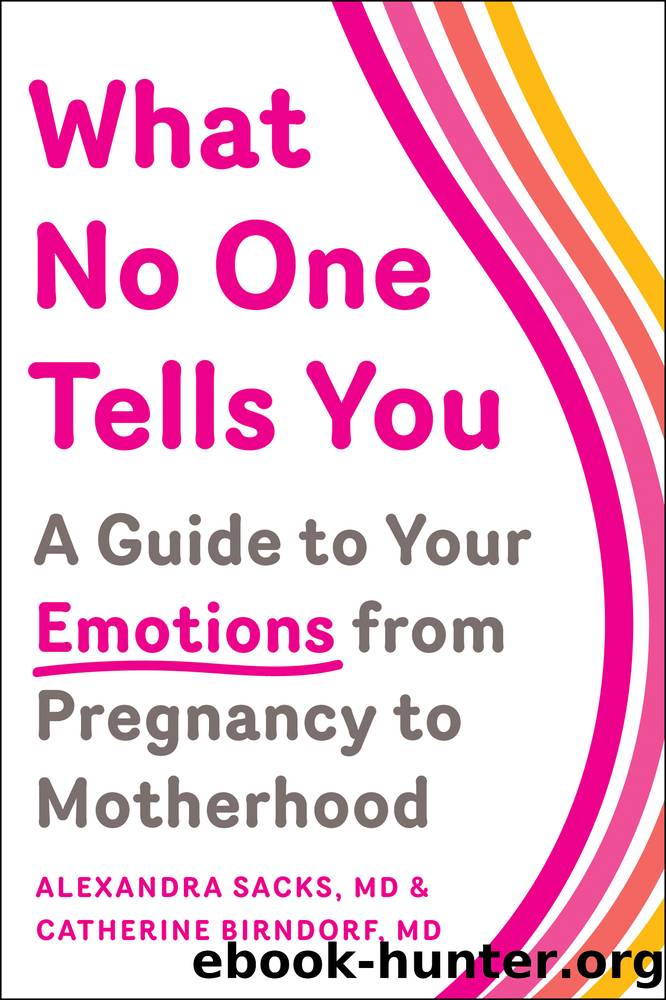What No One Tells You by Alexandra Sacks & Alexandra Sacks

Author:Alexandra Sacks & Alexandra Sacks
Language: eng
Format: epub
Publisher: Simon & Schuster
Published: 2019-04-23T00:00:00+00:00
Beginning One Marathon While Recovering from Another
Whether you delivered vaginally or had a C-section, your body has just gone through a major ordeal. Traditionally, your doctor or midwife may have given you some general instructions, like not exercising or having sex for a while, and how to care for any stitches or healing incisions you may have. But if you arenât scheduled to have a follow-up appointment for six weeks or more after delivery, this is a shockingly long time to be off on your own, especially since your doctor probably wanted to see you often during your pregnancy. As much as you may have complained about having to go to the doctor before, if she is not requesting to see you in the first few weeks after childbirth, you may feel abandoned and neglected. It may also reinforce the message youâll be getting from many sides: The babyâs care is more important than yours.
If youâd just come out of the hospital after a different surgery, no one would expect you to manage on your own without a checkup for over a month. Thankfully, in 2018 the American College of Obstetrics and Gynecology (ACOG) came out with new guidelines for doctors to schedule the postpartum appointment at three weeks after childbirth; hopefully, common practice will follow these recommendations so that women will receive better care in the first few weeks of the postpartum period.
Expecting yourself to seamlessly pivot to caring for a newborn after the physical and emotional demands of birth is unrealistic. Many women have a hard time reconciling the fact that even if they feel energized to hit the ground running in new motherhood, their bodies just arenât keeping up. How can you take care of a newborn if you can barely walk? Because new moms arenât taught to focus on their own healing during this time, many criticize themselves for being lazy or selfish if they drag their feet when the baby cries.
In some cultures, family or neighbors step in to help a new mother recover from childbirth. In China, this period of time is called zuo yue zi, or âsitting the month.â The focus is on the motherâs healing: Relatives cook nurturing food and help manage the household. Typically, American society doesnât provide that kind of support, in either an intergenerational, communal, or public way.
Itâs not only that American culture doesnât have the expectation of family support for a new motherâitâs sometimes logistically impossible. When Americans leave their extended families to work in bigger cities, about a quarter of them are no longer within driving distance of family members who might have otherwise helped with a new baby. This means increased stress, isolation, and expense for the new parents.
In many other countries, when families are not able to step in to help with child care, there is a social structure for support. In France, the government subsidizes day care AND pelvic floor physiotherapy (to help with pelvic and vaginal recovery); in Sweden, you get over a
Download
This site does not store any files on its server. We only index and link to content provided by other sites. Please contact the content providers to delete copyright contents if any and email us, we'll remove relevant links or contents immediately.
| Administration & Medicine Economics | Allied Health Professions |
| Basic Sciences | Dentistry |
| History | Medical Informatics |
| Medicine | Nursing |
| Pharmacology | Psychology |
| Research | Veterinary Medicine |
Machine Learning at Scale with H2O by Gregory Keys | David Whiting(4290)
Fairy Tale by Stephen King(3368)
Will by Will Smith(2904)
Hooked: A Dark, Contemporary Romance (Never After Series) by Emily McIntire(2544)
Rationality by Steven Pinker(2349)
Friends, Lovers, and the Big Terrible Thing by Matthew Perry(2215)
The Becoming by Nora Roberts(2187)
Love on the Brain by Ali Hazelwood(2058)
A Short History of War by Jeremy Black(1841)
The Strength In Our Scars by Bianca Sparacino(1838)
HBR's 10 Must Reads 2022 by Harvard Business Review(1832)
Leviathan Falls (The Expanse Book 9) by James S. A. Corey(1724)
A Game of Thrones (The Illustrated Edition) by George R. R. Martin(1710)
515945210 by Unknown(1660)
Bewilderment by Richard Powers(1607)
443319537 by Unknown(1542)
The 1619 Project by Unknown(1456)
The Real Anthony Fauci: Bill Gates, Big Pharma, and the Global War on Democracy and Public Health (Childrenâs Health Defense) by Robert F. Kennedy(1396)
All About Love: New Visions by bell hooks(1328)
